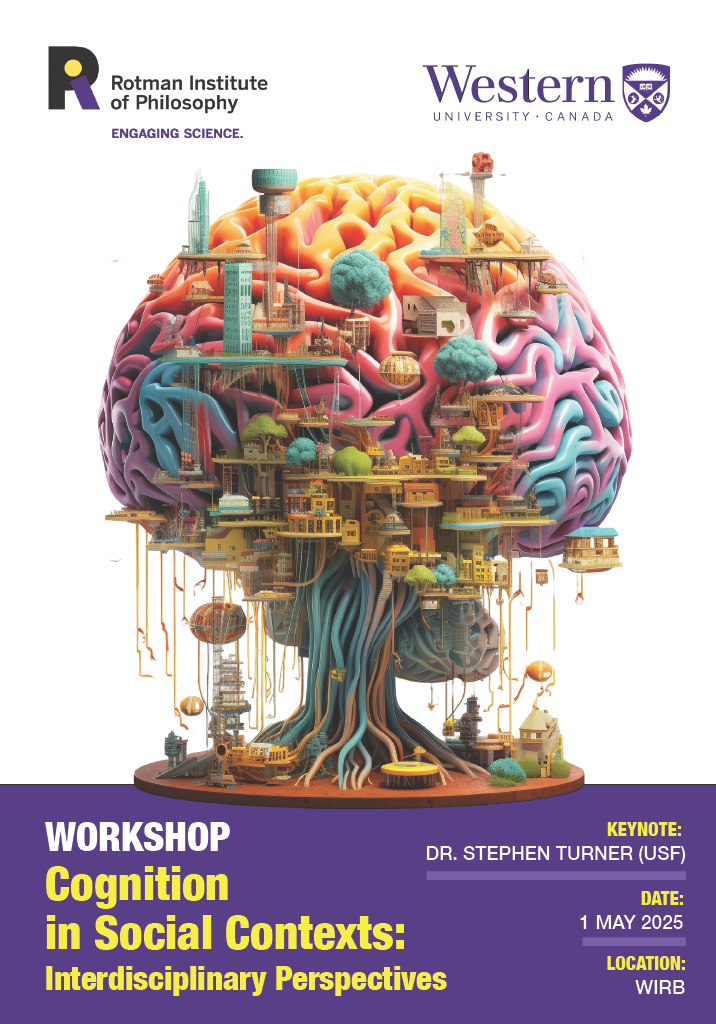

Workshop: Cognition in Social Contexts: Interdisciplinary Perspectives
1 May 2025, 8:30 am - 5:00 pm EDT
Workshop Registration
Registration is now CLOSED. Thank you for your interest.
See below for updated workshop program.
In recent decades, many new research fields have emerged at the intersection of the social and cognitive sciences, such as cognitive sociology (e.g., Zerubavel, 1997), cognitive anthropology D’Andrade, 1992), cultural psychology (e.g., Shweder, 1991), and social neuroscience (Cacioppo & Berntson, 2002), to name a few. While researchers in these fields have sought to leverage insights from both branches of science to investigate human cognition in various societal contexts—social, cultural, political, historical, technological, and economic, they face significant conceptual, ontological, epistemological, and methodological challenges when conducting their investigations (see Ignatow, 2014; Kaidesoja et al., 2019; Strydom, 2007; Turner, 2018 for instance).
This one-day workshop focuses on philosophical issues that arise at the intersection of the E-cognitive sciences (E—embodied, enactive, extended, embedded, ecological, evolutionary, etc.), and the social sciences. For instance, how do researchers at this intersection conceptualize and model the relationship between mind, brain, body, and society? What approaches do they adopt to reconcile and/or use dissimilar theories, concepts, and explanations from different research programs? How do researchers identify scientific objects, levels of analysis, and research methods for investigating the phenomena of their interest? In what ways does their interdisciplinary work contribute to the scientific understanding of human cognition and behavior? What are the implications of their work for traditional philosophical questions about the mind, self, agency, and society?
This workshop aims to (1) explore interdisciplinary approaches to studying human cognition in society and identify points of convergence and divergence, (2) gauge the contribution of these approaches to the advancement of scientific understanding of the mind, (3) foster interdisciplinary conversations between E-cognitive scientists, social scientists, and philosophers, (4) explore opportunities for potential collaboration between different research groups, and (5) explore the role that institutions play in fostering interdisciplinary collaboration and scientific progress.
Workshop Themes and Questions
We invite submissions that address, but are not limited to, the following themes and questions:
- nE approaches to social cognition
- Cognitive social science
- Social ontology
- Social agency and collective action
- Scientific practices
How do researchers from the E-cognitive sciences (ECS), such as those working in the traditions of ecological psychology, enactivism, and phenomenology, conceptualize the relationship between mind and society?
What role does the environment—ecological, social, cultural, political, historical, technological, economic—play in shaping human social interactions and cognition?
What constraints, if any, enable and limit interdisciplinary work, conversations, and collaborations?
Keynote Speaker
Our keynote speaker for the event is Stephen Turner, Distinguished University Professor, USF. Prof. Turner has numerous publications on the topic of the workshop, including Cognitive Science and the Social: A Primer and Understanding the Tacit.
Workshop Program
| 8:30-8:50 | Coffee and light refreshments | |
| Morning Session (Chair: Michael L. Anderson) | ||
| 8:50-9:20 | Jay McKinney (Carleton College) | Interactionist Cognitive Science |
| 9:20-9:50 | Justin Daduya (University of the Philippines Diliman) | What Even Is Ideology?: A Cognitive Science-Driven Research Agenda |
| 9:50-10:00 | Coffee Break | |
| 10:00-11:00 | Stephen Turner (University of South Florida) | Keynote address: Where are we now, and where we might retrace steps |
| 11:00-12:00 | Invited lightning talks (Priscila Barros, Manpreet Rai, Jonathan De Souza) | |
| 12:00-13:30 | Lunch Break | |
| Afternoon Session (Chair: Priscila Ribeiro Prado Barros) | ||
| 13:30-14:00 | Shayan Morshedi (Memorial University of Newfoundland and Labrador) | Bridging Meta-Memory to Collective Memory: Meta-Collective Memory |
| 14:00-14:30 | Frederic Mirindi (University of Manitoba) and Derrick Mirindi (Morgan State University) | The Economic Implications of Cognitive AI: A Social-Computational Framework for Understanding Machine Intelligence |
| 14:30-15:00 | Konrad Werner (University of Warsaw | The Enactment of Problems and Institutions to Solve Them |
| 15:00-15:10 | Coffee Break | |
| 15:10-15:40 | Emma Otterski | Understanding Others’ Emotions: Social Status and Attention to Context |
| 15:40-16:10 | Varun Ravikumar (Western University) | Habitus and Affordance: Towards a Radical Embodied Cognitive Social Science |
| 16:10-17:00 | Panel Discussion | |
| Closing remarks | ||
Financial and Travel Information
There are no registration fees for the workshop. Unfortunately, we are unable to provide funding for transportation or accommodation for selected workshop participants. We encourage participants to explore financial support options through their home institutions. For applicants from countries requiring a Canadian travel visa, please review the visa appointment and processing times at your local Canadian embassy before you apply. Successful applicants will receive an invitation letter to support their visa application.
Contact Information
For any inquiries, please contact: Prof. Michael L. Anderson [mande54@uwo.ca], Varun Ravikumar [vraviku@uwo.ca].
Acknowledgements
This workshop is organized by Michael L. Anderson, Scott Schaffer, Varun Ravikumar, Priscila Ribeiro Prado Barros, and Eysan Demirkaya as part of the Rotman Interdisciplinary Think Tank Award Project “Ecological Psychology in Society.”
